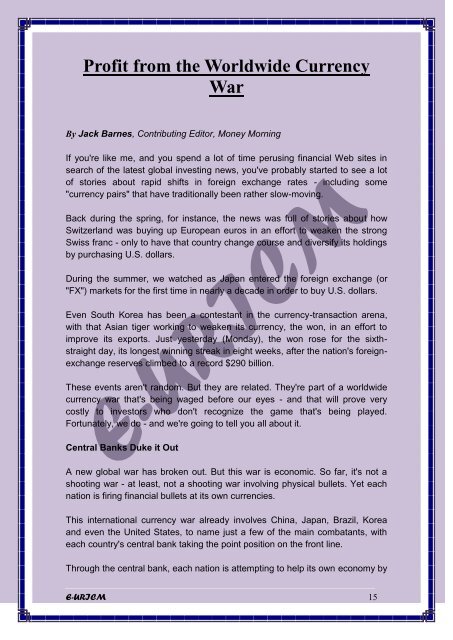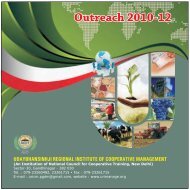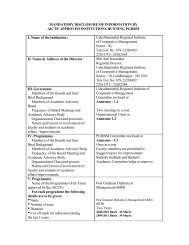URICM - UDAYBHANSINHJI - Regional Institute of Cooperative ...
URICM - UDAYBHANSINHJI - Regional Institute of Cooperative ...
URICM - UDAYBHANSINHJI - Regional Institute of Cooperative ...
You also want an ePaper? Increase the reach of your titles
YUMPU automatically turns print PDFs into web optimized ePapers that Google loves.
Pr<strong>of</strong>it from the Worldwide CurrencyWarBy Jack Barnes, Contributing Editor, Money MorningIf you're like me, and you spend a lot <strong>of</strong> time perusing financial Web sites insearch <strong>of</strong> the latest global investing news, you've probably started to see a lot<strong>of</strong> stories about rapid shifts in foreign exchange rates - including some"currency pairs" that have traditionally been rather slow-moving.Back during the spring, for instance, the news was full <strong>of</strong> stories about howSwitzerland was buying up European euros in an effort to weaken the strongSwiss franc - only to have that country change course and diversify its holdingsby purchasing U.S. dollars.During the summer, we watched as Japan entered the foreign exchange (or"FX") markets for the first time in nearly a decade in order to buy U.S. dollars.Even South Korea has been a contestant in the currency-transaction arena,with that Asian tiger working to weaken its currency, the won, in an effort toimprove its exports. Just yesterday (Monday), the won rose for the sixthstraightday, its longest winning streak in eight weeks, after the nation's foreignexchangereserves climbed to a record $290 billion.These events aren't random. But they are related. They're part <strong>of</strong> a worldwidecurrency war that's being waged before our eyes - and that will prove verycostly to investors who don't recognize the game that's being played.Fortunately, we do - and we're going to tell you all about it.Central Banks Duke it OutA new global war has broken out. But this war is economic. So far, it's not ashooting war - at least, not a shooting war involving physical bullets. Yet eachnation is firing financial bullets at its own currencies.This international currency war already involves China, Japan, Brazil, Koreaand even the United States, to name just a few <strong>of</strong> the main combatants, witheach country's central bank taking the point position on the front line.Through the central bank, each nation is attempting to help its own economy byE-<strong>URICM</strong> 15





